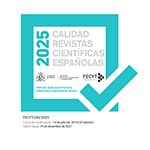Perdió el libro que se compró / había comprado pocos días antes: Reflexiones iniciales en torno al saber gramatical sobre los tiempos verbales del pasado en alumnos de Secundaria Obligatoria
Resumen
Alternating the verbal tenses in the past in written texts demands to take into account differences in aspects not frequently seen in spoken Spanish. According to López García (2005: 162) the system of five simple tenses (vengo, venía, vine, vendría, vendré) covers the expressive needs of the Spanish speakers, although children use less than adult speakers who rarely employ other forms. Problems come up when instead of speaking Spanish, we need to write it and read it. This necessity changes the range of verbal tenses completely, since it is essential for articulating a text, to clarify plainly that some events happen before or after others, in other words, secondary indexes of reference are required. The use of the past simple (perfecto simple in Spanish) in Compulsory Secondary students instead of the past perfect in written texts (Perdió el libro que se compró/había comprado pocos días antes) helps us as starting point to think about the necessity of a grammatical learning which causes the reflection of the use and develops the metalinguistic awareness, further from the knowledge of the verbal paradigm and from the uses of the spontaneous spoken language. This article presents the results of an experimental test which was carried out with students of the four courses of Compulsory Secondary studies in the month of May in 2006, as a part of a further investigation on the elaboration of the grammatical knowledge in relation to the past tenses and their aspectual differences in written texts.L’alternance entre les temps verbaux du passé dans des textes écrits exige considérer des différences aspectuelles peu fréquentes en espagnol parlé. D’après López García (2005:162) le système de cinq temps simples (vengo, venía, vine, vendría, vendré) est suffisant pour les nécessités expressives des hispanophones, bien que les enfants n’utilisent pas toutes les formes et que beaucoup de parlants adultes rarement en utilisent d’autres. Les problèmes se posent quand, au lieu de parler l’espagnol, nous avons besoin de l’écrire ou de le lire. Ce besoin change tout à fait l’inventaire de temps, puisque, pour articuler un texte, il faut préciser qu’il y a des faits qui sont antérieurs ou postérieurs à d’autres, c’est à dire, il faut des index secondaires de référence. La préférence pour le passé simple au lieu du plus-que-parfait dans des textes écrits (Perdió el libro que se compró/había comprado pocos días antes) des élèves de l’Enseignement Secondaire Obligatoire est notre point de départ pour réfléchir sur le besoin d’un apprentissage grammatical qui favorise la réflexion sur l’usage et développe la conscience métalinguistique, au-delà de la connaissance du paradigme verbal et des usages spontanés du langage parlé. L’article présente les résultats d’une épreuve exploratoire réalisée avec des élèves des quatre cours de l’Enseignement Secondaire Obligatoire en mai 2006, faisant partie d’une recherche plus approfondie sur l’élaboration du savoir grammatical sur les temps du passé et leurs différences aspectuelles dans des textes écrits.
Descargas
Descarga artículo
Licencia
La revista Didáctica. Lengua y Literatura, para fomentar el intercambio global del conocimiento, facilita el acceso sin restricciones a sus contenidos desde el momento de su publicación en la presente edición electrónica, y por eso es una revista de acceso abierto. Los originales publicados en esta revista son propiedad de la Universidad Complutense de Madrid y es obligatorio citar su procedencia en cualquier reproducción total o parcial. Todos los contenidos se distribuyen bajo una licencia de uso y distribución Creative Commons Reconocimiento 4.0 (CC BY 4.0). Esta circunstancia ha de hacerse constar expresamente de esta forma cuando sea necesario. Puede consultar la versión informativa y el texto legal de la licencia.










